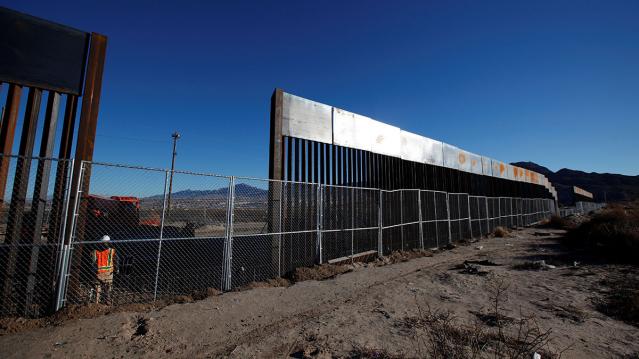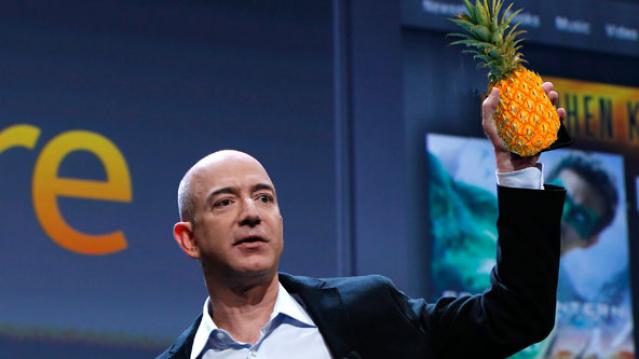Trump Diverting $3.6 Billion from Military to Build Border Wall

The Department of Defense has approved a plan to divert $3.6 billion to pay for the construction of parts of President Trump’s border wall, Defense Secretary Mark Esper said Tuesday. The money will be shifted from more than 100 construction projects focused on upgrading military bases in the U.S. and overseas, which will be suspended until Congress provides additional funds.
In a letter addressed to Senator James Inhofe, chair of the Armed Services Committee, Esper said that in response to the national emergency declared by Trump earlier this year, he was approving work on 11 military construction projects “to support the use of armed forces” on the border with Mexico.
The $3.6 billion will fund about 175 miles of new and refurbished barriers (Esper’s letter does not use the term “wall”).
Esper described the projects, which include new and replacement barriers in San Diego, El Paso and Laredo, Texas, as “force multipliers” that, once completed, will allow the Pentagon to redeploy troops to high-traffic sections of the border that lack barriers. About 5,000 active duty and National Guard troops are currently deployed on the border.
Months in the making: Trump’s declaration of a national emergency on the southern border on February 15, 2019, came in the wake of a showdown with Congress over funding for the border wall. The president’s demand for $5.7 billion for the wall sparked a 35-day government shutdown, which ended when Trump reluctantly agreed to a deal that provided $1.375 billion for border security. By declaring a national emergency, Trump gave the Pentagon the legal authority to move billions of dollars around in its budget to address the purported crisis. Legal challenges to the emergency declaration are ongoing.
Conflict with lawmakers: Congress passed a resolution opposing the national emergency declaration in March, prompting Trump to issue the first veto of his presidency. Democrats on the House Appropriations Committee reiterated their opposition to Trump’s move Tuesday, saying in a letter, “As we have previously written, the decision to take funds from critical military construction projects is unjustified and will have lasting impacts on our military.”
Majority Leader Steny H. Hoyer was more forceful, saying in a statement, "It is abhorrent that the Trump Administration is choosing to defund 127 critical military construction projects all over the country … and on U.S. bases overseas to pay for an ineffective and expensive wall the Congress has refused to fund. This is a subversion of the will of the American people and their representatives. It is an attack on our military and its effectiveness to keep Americans safe. Moreover, it is a political ploy aimed at satisfying President Trump's base, to whom he falsely promised that Mexico would pay for the construction of an unnecessary wall, which taxpayers and our military are now being forced to fund at a cost of $3.6 billion.”
A group of 10 Democratic Senators said in a letter to Esper that they “are opposed to this decision and the damage it will cause to our military and the relationship between Congress and the Department of Defense.” They said they also “expect a full justification of how the decision to cancel was made for each project selected and why a border wall is more important to our national security and the well-being of our service members and their families than these projects.”
Politico’s John Bresnahan, Connor O'Brien and Marianne LeVine said the diversion will likely be unpopular with Republican lawmakers as well. Republican Senators Mike Lee and Mitt Romney expressed concerns Wednesday about funds being diverted from their home state of Utah. "Funding the border wall is an important priority, and the Executive Branch should use the appropriate channels in Congress, rather than divert already appropriated funding away from military construction projects and therefore undermining military readiness," Romney said.
The Pentagon released a list of construction projects that will be affected late on Wednesday (you can review a screenshot tweeted by NBC News’ Alex Moe here).
An $8 billion effort: In addition to the military construction funds and the money provided by Congress, the Trump administration is using $2.5 billion in drug interdiction money and $600 million in Treasury forfeiture funds to support the construction of barriers on the southern border, for a total of approximately $8 billion. (More on that here.)
The administration reportedly has characterized the suspended military construction projects as being delayed, but to be revived, those projects would require Congress approving new funding. House Democrats have vowed they won’t “backfill” the money.
The politics of the wall: Trump has reportedly been intensely focused on making progress on the border wall, amid news that virtually no new wall has been built during the first two and a half years of his presidency. Speaking to reporters at the White House Wednesday, Trump said that construction on the wall is moving ahead “rapidly” and that hundreds of miles will be “almost complete if not complete by the end of next year … just after the election.”
Hollywood Box Office Fail: A Memorial Day to Forget

For years, Memorial Day weekend has been the unofficial beginning of summer blockbuster season, with the multitudes rushing in to enjoy free air conditioning, buttered popcorn and big explosions. And though Hollywood has started releasing its blockbusters earlier and earlier (Marvel/Disney, in particular seems to love the first weekend in May), the audiences don’t seem to have gotten the message.
Tomorrowland, the weekend’s No. 1 grossing film, took in an unimpressive $40.7 million, just ahead of 2010’s groan-worthy Prince of Persia on the list of holiday weekend openers.
Memorial Day 2015 was the worst holiday weekend for Hollywood since 2001, when Michael Bay’s infamous WWII flop Pearl Harbor graced the screens. Considering the 44 percent increase in ticket prices over that time, this is a particularly bleak outlook for theaters.
Related: 13 Movies You Should See This Summer
Tomorrowland only barely beat Pitch Perfect 2, in its second week of release.
In 2014, X-Men: Days of Future Past took home $110.6 million, while the previous year had the sixth entry in the Fast and the Furious franchise to drive $97.4 million domestically.
The news is better internationally, where the most recent Avengers film (Avengers: Age of Ultron) continues to rake in the yuan, millions at a time. But the outlook for the rest of the domestic season is less rosy, with no obvious saviors later in the summer (Jurassic World, maybe?).
It’s not even June yet, but it is already looking like a chilly summer for Hollywood.
Here’s Why Your Breakfast Just Got Way More Expensive

You’re going to have to start shelling out a lot more for your eggs.
U.S. farmers in 20 states have killed more than 40 million chickens and turkeys since December, including about a third of the commercial, egg-laying birds in Iowa, as the United States experiences its biggest-ever bird flu outbreak.
The diminishing poultry population has led to an egg supply crunch, pushing prices some 85 percent higher, according to The Wall Street Journal. Economists say prices could spike another 20 to 30 percent.
The outbreak comes just as eggs are returning to favor with consumers after years of fighting perceptions that they’re unhealthy. In 2013, Americans consumers munched on more than 250 eggs per capita, the highest rate in six years.
Related: Minnesotans in contact with avian flu birds getting preventive drugs
Last year, the U.S. poultry industry produced nearly 100 billion eggs. USDA associate deputy administrator Jack Shere told the Associated Press that the avian flu could cost the U.S. taxpayers about $400 million this year.
Big Food companies are already considering changes to their menus and their pricing following the shortage. McDonald’s, Panera Bread, and General Mills, The New York Times reports.
The last serious avian flu outbreak in the United States occurred in 1983 and led to the killing of 17 million chickens, turkey, and guinea fowl in Pennsylvania and Virginia. While avian flu spread to humans in Asia in 2003, the Centers for Disease Control considers the risk to people from the current strain to be low.
Amazon’s Jeff Bezos Has Gotten $9.5 Billion Richer This Year

The stock market has inched its way to one record high after another this year, with the S&P 500 gaining a solid if unspectacular 3.5 percent so far. That rise has enriched investors by some $900 billion in 2015, as Matt Krantz at USA Today points out.
As Krantz also notes, though, some shareholders have done far, far better than the broader market. Jeff Bezos, for example.
The Amazon CEO has benefitted from a 40 percent rise in his company’s stock in 2015, adding a whopping $9.5 billion in paper gains to his already sizable net worth to lift it to $38.2 billion, good enough for 11th highest in the world, according to Bloomberg’s Billionaires Index.
Related: 7 Quirky Economic Indicators – from Dogs to Guns
As well as Bezos has done, four foreign billionaires have actually made more in 2015: Pan Sutong, chairman of Hong Kong investment conglomerate Goldin Group, has made more than $20 billion; Wang Jianlin, the founder and chairman of another Chinese conglomerate, Dalian Wanda, has made $19.4 billion; Zhou Qunfei, China’s richest woman, has added nearly $11 billion; and Patrick Drahi, the French chairman and largest shareholder of Luxembourg-based telecom company Altice, has gained $9.7 billion.
Bezos may be far ahead of the U.S. pack, but the USA Today analysis of data from S&P Capital IQ shows some other CEOs of American companies have fared extremely well as a result of their stock holdings, too. Facebook’s Mark Zuckerberg has made more than $1 billion on paper, while Google’s Larry Page has gained just under $1 billion. And as shares of drugstore chain Walgreens Boots Alliance have surged more than 11 percent this year, acting CEO Stefano Pessina has profited to the tune of $645.6 million. The CEOs of salesforce.com, Under Armour, Starbucks, Mohawk Industries, Constellation Brands and Netflix have all seen paper gains of more than $260 million so far in 2015.
You can see USA Today’s full list here.
This Man Just Lost $15 Billion in a Half Hour

In the history of sudden wealth loss, Li Hejun may have set a new record.
Li, who was China's richest man until this week, saw his fortune drop by as much as $15 billion in a half-hour as the stock in his company, Hanergy Thin Film Power Group, fell by nearly half. Trading in the shares was halted Wednesday and Li didn't attend the company's annual meeting.
While plenty of billionaires have seen their fortunes cut in half over time, few if any have seen $15 billion wiped out in a half-hour. Li's total fortune was around $30 billion before the stock plunged.
Prior to the drop, the company's shares had risen by more than fivefold since September, baffling analysts. Reuters reports that Hong Kong regulators are looking at alleged market manipulation with the stock.
Related: America’s Highest Paid CEO: It’s Not Who You Think
In a similar wealth decline, Hong Kong property and electronics magnate Pan Sutong has lost more than $11 billion this week as shares of two listed companies, Goldin Financial and Goldin Property, both closed down more than 40 percent.
Pan owns around 65 percent of Goldin Property and more than 70 percent of Goldin Financial, according to filings. His fortune was listed at more than $28 billion, making him Hong Kong's second-richest man.
That means that the two men have lost more in one day that the total net worth of Carl Icahn, Steve Ballmer or Michael Dell.
Pan is known for his large lifestyle. He's a big polo supporter and has sponsored a polo event in Britain attended by Princes William and Harry. He's said that the sport "is a way of life and belief in a sense of nobility."
Pan also owns vineyards around the world, including three in France and one in California's Napa Valley, called the Sloan Estate, which he purchased in 2011 for around $40 million.
This article originally appeared on CNBC
Read more from CNBC:
Playboy keeps it's clothes on
Kickstarter darling Pebble may be in a rough patch
McDonald's CEO: Ronald is here to stay
How to Avoid the Worst Fees in America
Nothing gets under the skin of a savvy consumer like unwarranted and unwanted fees.
The Web site GoBankingRates.com has put together a list of the “31 Worst Fees in America,” listing some of the most egregious fees out there, as well as tips on two avoid them. The list includes 11 banking fees, 10 travel fees, and handful of fees from other categories such as health care and cell phones.
“At the bank, while traveling, or just when going about your daily business, fees are on the rise in seemingly all industries—and not just in quantity, but in price,” writes author Paul Sisolak. “Many times, they’re so well obscured that you end up paying fees without realizing it.”
The good news is that in most cases, there’s an easy fix for the fees: Avoid bank teller fees, for example, by using remote deposit and ATMs; and steer clear of ATM fees by using your bank’s app to find the nearest in-network machine.
Related: 10 Infuriating Consumer Fees to Stop Paying Now
While bank fees may be rising, the institutions are getting better about being transparent in disclosing them. More than 60 percent of the banks reviewed last week by The Pew Charitable Trusts have adopted a summary disclosure box of terms and fees that meets the organization’s standards, up from just 25 percent in 2013.
When it comes to avoiding fees while traveling, pack light to avoid overweight bag charges and call ahead of time to get a sense of Wi-Fi and other hotel/resort fees.

